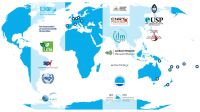Pace-Net Plus

The Pacific-Europe Network for Science, Technology and Innovation (PACE-Net Plus) project was a 3-year programme to encourage bioregional dialogue between European and Pacific researchers.
The project, which ended in October 2016, brought together policy makers, funding agencies, and representatives from research, innovation and development institutions from the Pacific and Europe to produce policy briefs in three key thematic areas of high priority to both:
- Health, demographic change and wellbeing
- Food security, sustainable agriculture, marine and maritime research
- Climate action, resource use and efficiency, and raw materials.
The idea of innovation as an essential means to tackle global challenges and respond to the objectives of the Europe 2020 strategy was also a key focus for the project.
There were 16 partners, 6 from Europe and 10 from the South Pacific. As the New Zealand partner and key contact, Landcare Research’s role was to disseminate information about the programme to New Zealand researchers, policymakers and funding agencies, and to facilitate networking opportunities between New Zealand, South Pacific and European researchers.
The project was successful in gaining more visibility for the Pacific Region in the European Commission (EC) (the organisation responsible for running the main EU funding programme, Horizons 2020). The EC is dedicated to passing on the PACE-Net Plus outcomes to the EU Directorates for research and innovation, and international development, and the Pacific Region has been added to the EU internal roadmaps used to develop funding priorities.
An additional outcome for the project was the Regional Science, Technology and Innovation Roadmap developed to assist countries in the Pacific Region in developing a regional strategy. The project team is pleased to be able to report that several PICTs are presently working on a “National STI Strategy” and/or already nominated (or will soon nominate) a Chief Scientist as a result of the project. Our hope is that development of the Regional STI strategy will continue to progress in collaboration with the regional research organisations in the area (e.g. SPC, USP and the PIF).


